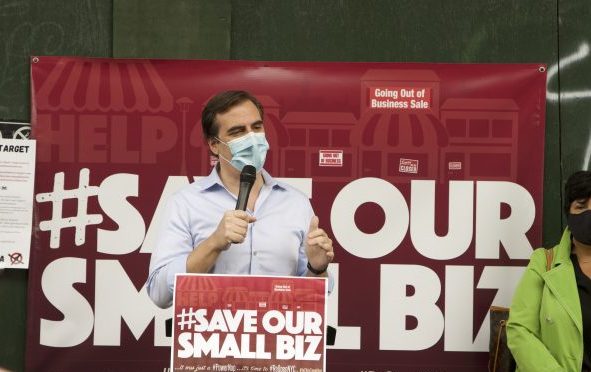Cornegy’s TPT Hearing Succeeds in Moving Reform Forward

City Council Member Robert E. Cornegy, Jr. (D-Brooklyn) and the council’s Housing and Buildings Committee yesterday took important steps in fixing the flaws in the city’s Third Party Transfer (TPT) program.
The TPT scandal was first broken by Kings County Politics, now PoliticsNY, and a subsequent 30-part series that culminated with millions of dollars of intergenerational wealth returned to Black and Latino families in Central Brooklyn.
Through TPT, the City foreclosed on properties with municipal liens and transferred these properties to third parties for rehabilitation and subsequent occupation. Too often, homes were seized for very small municipal charges, especially in Crown Heights and Bedford-Stuyvesant.
“The TPT Program, as designed in 1996, isn’t applicable to the NYC of today. Thanks to Commissioner Carroll and the team at HPD, the Working Group participants, and all the community advocates who lent their insights and expertise. I look forward to taking these ideas forward and ensuring we produce the fair-minded, thoughtful policy our city needs,” said Cornegy.
“TPT has consistently robbed African American families of their homes but protecting them is easier said than done. Today we have shown that we have public servants and community activists willing and able to fix a complex problem dating back to 1996,” he added.
The meeting reviewed four pieces of legislation to reform the TPT program, but did not include any legislation addressing the tighter regulation of nonprofit property managers and developers. These nonprofits – and their inherent relationships with HPD – have financial interests in taking properties under the TPT program.
Meng Introduces Legislation to Increase Local Mental Health Services

U.S. Rep. Grace Meng (D-Queens) yesterday introduced the Mental Health Workforce and Language Access Act, a bill that seeks to increase language access to mental health services at community health centers.
“The COVID-19 pandemic has taken a toll on the mental health of so many of my constituents in New York and individuals across the country, escalating the demand for mental health professionals,” said Meng. “The fear of coronavirus-related hate crimes against many communities – such as the Asian American community – has only underscored this urgent need for assistance. But for those who may not possess English language proficiency, help is often out of reach. This lack of access is unacceptable and must change.”
According to the Kaiser Family Foundation, about 4 in 10 adults in the U.S. have reported symptoms of anxiety or depressive disorder, up from one in ten adults who reported these symptoms in 2019. As 1 in 12 people across the United States rely on community health centers for care, this phenomenon has been acutely felt at these facilities.
Meng’s bill would:
Establish a four-year pilot program to provide additional benefits to mental health professionals who commit to serving in specific Federally Qualified Health Centers.
Establish a new grant program that would provide federal grants to community health centers to help them recruit, hire, and employ qualified mental health professionals who are fluent in a language other than English.
Gianaris Questions PSC’s Decision to Hike National Grid Rates

Senate Deputy Leader Michael Gianaris (D-Queens) wrote Governor Kathy Hochul on Nov. 8 urging her to look into the recent decision by the Public Service Commission (PSC) to allow National Grid to raise rates in their downstate region to build out their fossil fuel infrastructure.
In the letter, Gianaris argues hiking rates to build this infrastructure runs afoul of the Climate Leadership and Community Protection Act (CLCPA), the nation-leading climate law passed in 2019.
“Ratepayers should not be investing in yesterday’s infrastructure to address tomorrow’s challenges. That’s why the Senate led the way and enacted the CLCPA. The PSC’s decision does not comport with the goals that the Governor and Legislature share,” said Gianaris. “I am asking Governor Hochul to review the PSC’s decision, because frontline environmental justice communities should not pay for the same infrastructure that caused the havoc we’re already experiencing.”
Gianrais’ letter comes on the heels of Hochul signing his legislation (A.5838/S.1199) mandating a consumer advocate have a voting seat on the PSC. The PSC is comprised of five members. The board regulates telecommunications, electricity, steam, natural gas, and water service delivery. Currently, there are no membership requirements. This bill would mandate one member have expertise in utility consumer advocacy. All members are nominated by the Governor and confirmed by the state Senate.
Hochul Signs Consumer Credit Fairness Act Into Law

Governor Kathy Hochul on Nov. 8 signed the Consumer Credit Fairness Act (S.153/A.2382) to protect vulnerable New Yorkers from predatory and unscrupulous debt collection practices.
Senator Kevin Thomas (D-Levittown), who Chairs the Senate Committee on Consumer Protection, and Assemblymember Helene Weinstein (D-Brooklyn) sponsored the measure in their respective chambers.
The Consumer Credit Fairness Act (CCFA) strengthens consumer protections in debt collection proceedings by:
Requiring a notice to be mailed to the defendants in consumer credit actions by the clerk of the court, ensuring that defendants are given notice of the lawsuit;
Requiring court filings to include more information about the debt targeted in a lawsuit, such as identifying the debt or account and providing proof that the debt is owed to the plaintiff;
Lowering the statute of limitations for consumer credit transactions from six years to three years, compelling creditors to file claims in a timely manner and protecting consumers from excessive interest charges and late fees;
Establishing specific requirements for applications for default judgments in consumer credit actions to prevent debt buyers from suing on expired debt.
“My legislation will protect consumers from unfair credit card collection practices by debt collectors. Too many improper judgments have been obtained against unsuspecting consumers who have done nothing wrong, and it is time to add teeth to the law to prevent these kinds of debt collection abuses from occurring,” said Weinstein.
“Abusive and exploitative debt collection lawsuits have become an epidemic across New York State. The consequences of these lawsuits—which often prey on the elderly, disabled, and low and moderate-income New Yorkers—are devastating, especially at a time when New Yorkers are already suffering financial difficulties as a result of COVID-19,” said Thomas.









